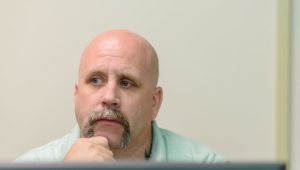 In June 2020, Jeremy Wells warned prison officials about violent activity by other prisoners at August State Medical Prison in Georgia, but the officials took no action. Soon after, Mr. Wells was brutally attacked by those very individuals and suffered serious injuries.
In June 2020, Jeremy Wells warned prison officials about violent activity by other prisoners at August State Medical Prison in Georgia, but the officials took no action. Soon after, Mr. Wells was brutally attacked by those very individuals and suffered serious injuries.
He brought a lawsuit in federal court, seeking relief for prison officials doing nothing to prevent the violent attack. Being indigent, Mr. Wells sought permission to proceed in forma pauperis, or without payment of the usual fees associated with a lawsuit. The federal in forma pauperis statute is one of the few lifelines offered to prisoners seeking to vindicate their rights when they cannot afford an expensive lawsuit.
The district court denied that permission and dismissed Mr. Wells’ suit, finding that he had three prior “strikes” under the Prison Litigation Reform Act (PLRA). The court assessed two of those “strikes” to cases that were dismissed for failing to exhaust administrative remedies. This is an atextual reading of the PLRA, as the PLRA lists only three grounds for assessing a dismissal as a “strike”: frivolousness, maliciousness, or failing to state a claim.
Failing to exhaust administrative remedies is simply not one of those grounds.
In fact, in Jones v. Bock, the U.S. Supreme Court made clear that the failure to exhaust administrative remedies is an affirmative defense that must be raised by the defendants. Plaintiffs are not required to plead it.
Yet, cases in courts within the Eleventh Circuit are dismissed once a week for failure to exhaust administrative remedies and at least once a month, a prisoner is found to have three strikes – and thus is barred from the court – because of a dismissal for failure to exhaust.
The Roderick & Solange MacArthur Justice Center represented Mr. Wells on appeal in the Eleventh Circuit.
UPDATE: The Eleventh Circuit, sitting en banc, unanimously agreed that Mr. Wells should not have received a strike for a case dismissed for failure to exhaust administrative remedies. Under the Eleventh Circuit’s new rule, these prisoners will have access to courts.
Three judges wrote separately to urge district courts to reconsider their prisoner pro se complaint forms, which often asks prisoners to provide information about exhaustion that is not their burden.
Strike calculations are high stakes. The Eleventh Circuit got it right by reversing an atextual rule that has resulted in hundreds of prisoners being denied access to courts over the past few decades. The MacArthur Justice Center is proud that Jeremy Wells will get his day in court.
Key Documents
- Opinion (U.S. Court of Appeals for the 11th Circuit) - 02/01/23
- Opening Brief of Appellant - 06/17/21
- Amicus Brief (Brennan Center for Justice at NYU School of Law) - 06/25/21
- Opinion (U.S. Court of Appeals for the 11th Circuit) - 12/02/21
- Petition for Panel Rehearing and Rehearing En Banc - 02/07/22
- En Banc Brief of Appellees - 07/14/22
- Amicus Brief (Florida Justice Institute, et al.) - 06/24/22
- En Banc Amicus Brief (Constitutional Accountability Center) - 06/24/22
- En Banc Amicus Brief (ACLU) - 06/24/22
- En Banc Brief of Plaintiff-Appellant - 06/14/22
- Opinion (U.S. Court of Appeals for the 11th Circuit) - 04/15/22
- Amicus Brief (Florida Justice Institute, et al.) - 02/23/22
- Amicus Brief (ACLU) - 02/23/22
For media inquires please contact:
(NOTE: This mailbox is for media inquiries only. All other inquiries, including legal and representation questions, should be submitted through our Contact Form.)
